Today was a preview day for the expedition. We heard a few excellent lectures that oriented us to UNIS (Dr. Hanne Christiansen), the weather of Svalbard (Dr. Ole Humlum), and paleoclimatology (Dr. Al Werner) before we went on a hike up the local glacier, Longyearbreen. (breen = glacier). You never saw a happier bunch of people than our group walking through snow and ice on the glacier!
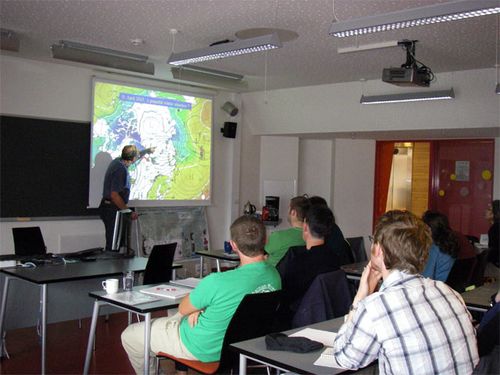 Lectures are an important part of starting a field study with students.
Lectures are an important part of starting a field study with students.
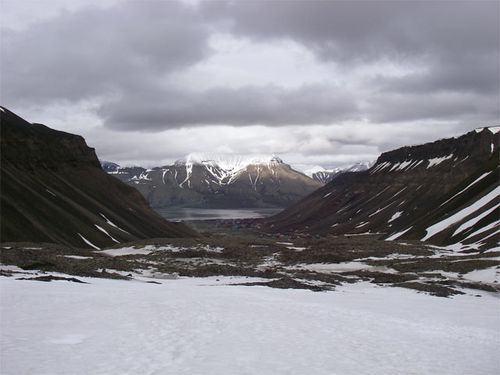 A gorgeous hike afforded us a great view across the fjord
A gorgeous hike afforded us a great view across the fjord
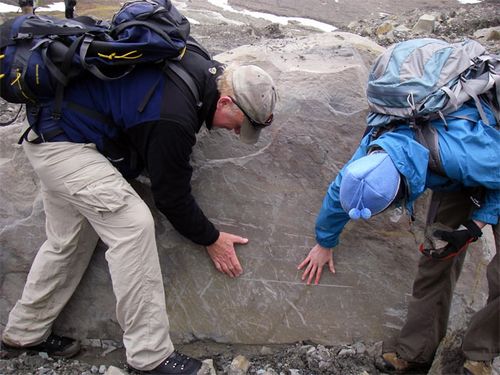 Check out the markings (called striations) on this boulder showing that it tumbled pretty hard to get to this spot
Check out the markings (called striations) on this boulder showing that it tumbled pretty hard to get to this spot
I want to use this journal entry to introduce you to the Principle Investigators (PI's) of this expedition and also fill you in the program the undergraduate students are involved in here on Svalbard. A quick clarification point for those out there who may think this is a different program. The PolarTREC name for this expedition is High Arctic Change 08, but the students here are part of a program called Svalbard REU, a US National Science Foundation funded field research program for undergraduate students.
This program was conceived in the late 1990's when there was a desire by the Norwegian government to involve the United States in research on Svalbard. A small grant was written and awarded in 2000 to visit Svalbard to assess the feasibility of using Svalbard for a research program for undergraduate students. A positive visit meant it was time to apply to NSF for major funding to create REU Svalbard. The grant award came through and REU Svalbard was born! This original award ran out, and it was so well received that it was awarded funding to run the program for another 5 years including this year. The PI's thank Jane Dionne, retired NSF Program Manager for Arctic Natural Sciences, and David Verado, who at the time was NSF Program Manager for Earth System History for their strong support of this successful program.
The Principal Investigators for the program are Dr. Al Werner (Primary Investigator from Mt. Holyoke College), Dr. Steve Roof (Assistant Director from Hampshire College), Dr. Julie Brigham-Grette (Senior Personnel from UMass Amherst), Dr. Mike Retelle (Senior Personnel from Bates College), and Dr. Ross Powell (Senior Personnel from Northern Illinois university). The PI's take turns heading into the field and this year (and in 2010 and 2012) Al and Mike are our leaders to Kapp Linne, and in the years 2009 and 2011 Ross and Julie will be taking students to Ny-Alesund in northern part of this island.
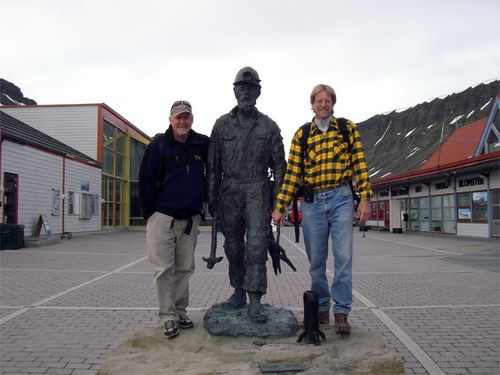 Mike and Al are the principal investigators of the High Artic Change 08 expedition and Svalbard REU
Mike and Al are the principal investigators of the High Artic Change 08 expedition and Svalbard REU
The goal of this program is to assist in addressing the perceived need to help launch the best and brightest in a career in the sciences. Approximately 40 students apply each year and seven are accepted. A successful applicant is bright, has a desire to study topics related to Arctic regions, and are interested in field research. To compensate the selected students for time they may otherwise use for a summer job, the students receive a stipend as a way to further encourage their participation. Their product is a thesis based on the data they collected in the field and is completed during the following year at their home colleges. Almost all students who complete this program continue on to graduate school and study the geosciences, climate change and the Arctic regions. If you know of a college junior fitting the criteria for this program, direct them to this journal on the PolarTREC website and to Svalbard REU website (https://www.mtholyoke.edu/proj/svalbard/welcome.shtml) for more information.
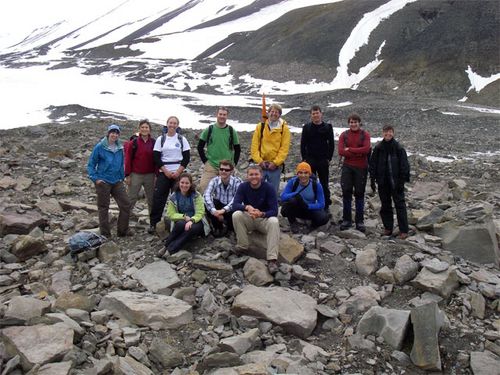 The gang (minus Mike Retelle) posing in front of Longyearbreen
The gang (minus Mike Retelle) posing in front of Longyearbreen
FYI: It's 12:30 AM and I see the sun and blue skies!
Tough challenge question of the day: Go back to the map or globe and find Svalbard, and look closely at its surroundings. What do you think influences the daily and annual weather patterns found here?

